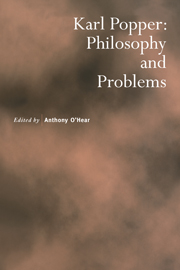Book contents
- Frontmatter
- Contents
- Introduction
- Popper, Science and Rationality
- Popper and Reliabilism
- The Problem of the Empirical Basis
- ‘Revolution in Permanence’: Popper on Theory-Change in Science
- Popper's Contribution to the Philosophy of Probability
- Propensities and Indeterminism
- Popper on Determinism
- Popper and the Quantum Theory
- The Uses of Karl Popper
- Popper and Darwinism
- Popper and the Scepticism of Evolutionary Epistemology, or, What Were Human Beings Made For?
- Does Popper Explain Historical Explanation?
- The Grounds for Anti-Historicism
- What Use is Popper to a Politician?
- Ethical Foundations of Popper's Philosophy
- Works of Karl Popper Referred to in the Text
- Notes on Contributors
- Index
‘Revolution in Permanence’: Popper on Theory-Change in Science
Published online by Cambridge University Press: 19 January 2010
- Frontmatter
- Contents
- Introduction
- Popper, Science and Rationality
- Popper and Reliabilism
- The Problem of the Empirical Basis
- ‘Revolution in Permanence’: Popper on Theory-Change in Science
- Popper's Contribution to the Philosophy of Probability
- Propensities and Indeterminism
- Popper on Determinism
- Popper and the Quantum Theory
- The Uses of Karl Popper
- Popper and Darwinism
- Popper and the Scepticism of Evolutionary Epistemology, or, What Were Human Beings Made For?
- Does Popper Explain Historical Explanation?
- The Grounds for Anti-Historicism
- What Use is Popper to a Politician?
- Ethical Foundations of Popper's Philosophy
- Works of Karl Popper Referred to in the Text
- Notes on Contributors
- Index
Summary
Introduction
Science, and in particular the process of theory-change in science, formed the major inspiration for Karl Popper's whole philosophy. Popper learned about the success of Einstein's revolutionary new theory in 1919 (the same year in which his discontent with Marxism and Freudianism reached crisis-point), and Einstein ‘became a dominant influence on my thinking–in the long run perhaps the most important influence of all.’ Popper explained why:
In May, 1919, Einstein's eclipse predictions were successfully tested by two British expeditions. With these tests a new theory of gravitation and a new cosmology suddenly appeared, not just as a mere possibility, but as an improvement on Newton–a better approximation to the truth … The general assumption of the truth of Newton's theory was of course the result of its incredible success, culminating in the discovery of the planet Neptune … Yet in spite of all this, Einstein had managed to produce a real alternative and, it appeared, a better theory … Like Newton himself, he predicted new effects within (and without) our solar system. And some of these predictions, when tested, had now proved successful.
(‘IA’, p. 28)Popper saw the development of science, through the process of change in accepted theory, as the exemplification of ‘the critical approach’. Science is rational because all of its theories are open to empirical criticism, and because it stands ready to reject any such theory if criticism succeeds, no matter how impressively the theory had performed in the past.
- Type
- Chapter
- Information
- Karl PopperPhilosophy and Problems, pp. 75 - 102Publisher: Cambridge University PressPrint publication year: 1996
- 2
- Cited by

